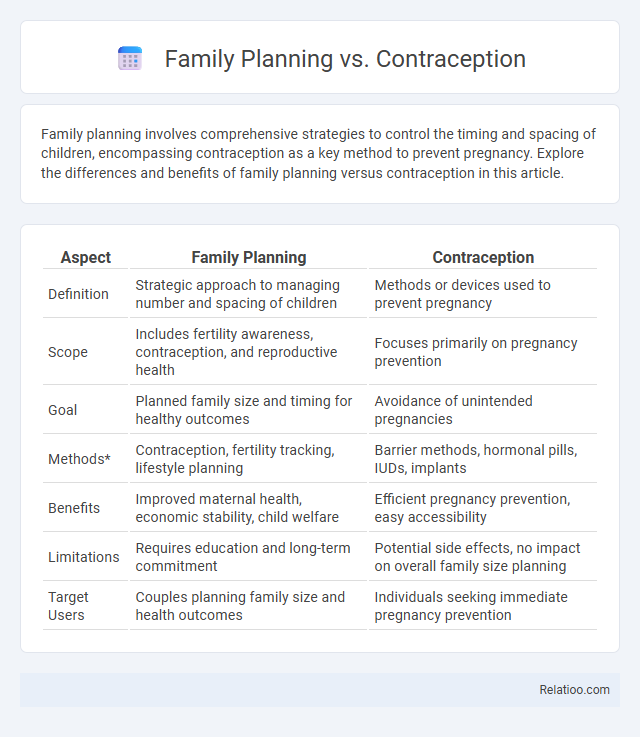Family planning involves comprehensive strategies to control the timing and spacing of children, encompassing contraception as a key method to prevent pregnancy. Explore the differences and benefits of family planning versus contraception in this article.
Table of Comparison
| Aspect | Family Planning | Contraception |
|---|---|---|
| Definition | Strategic approach to managing number and spacing of children | Methods or devices used to prevent pregnancy |
| Scope | Includes fertility awareness, contraception, and reproductive health | Focuses primarily on pregnancy prevention |
| Goal | Planned family size and timing for healthy outcomes | Avoidance of unintended pregnancies |
| Methods* | Contraception, fertility tracking, lifestyle planning | Barrier methods, hormonal pills, IUDs, implants |
| Benefits | Improved maternal health, economic stability, child welfare | Efficient pregnancy prevention, easy accessibility |
| Limitations | Requires education and long-term commitment | Potential side effects, no impact on overall family size planning |
| Target Users | Couples planning family size and health outcomes | Individuals seeking immediate pregnancy prevention |
Understanding Family Planning and Contraception
Family planning involves making informed decisions about the number and spacing of your children using various methods, including contraception, which directly prevents pregnancy through devices, medications, or procedures. Understanding the distinction between family planning and contraception is essential as family planning encompasses a broader approach to reproductive health, incorporating fertility awareness, counseling, and access to healthcare services beyond just contraceptive methods. Effective family planning empowers you to achieve your reproductive goals while promoting overall well-being for your family.
Key Differences Between Family Planning and Contraception
Family planning encompasses a broader range of strategies aimed at controlling the timing and size of a family, including fertility awareness, counseling, and contraceptive methods. Contraception specifically refers to the use of devices, medications, or procedures to prevent pregnancy, such as birth control pills, condoms, intrauterine devices (IUDs), and sterilization. The key difference lies in family planning's holistic approach to reproductive choices and life goals, while contraception is solely focused on preventing conception.
The Goals of Family Planning
Family planning aims to empower individuals and couples to determine the number and spacing of their children, promoting reproductive health and well-being. Contraception is a tool within family planning that helps prevent unintended pregnancies, complementing broader goals such as maternal health, economic stability, and population management. Your ability to access comprehensive family planning services ensures informed choices and improved quality of life for your family.
Types of Contraceptive Methods
Contraceptive methods encompass a range of options including hormonal methods (pills, patches, injections), barrier methods (condoms, diaphragms), intrauterine devices (IUDs), and permanent solutions such as sterilization. Family planning integrates these contraceptive options to help individuals and couples regulate the timing and size of their families effectively. Understanding the various types of contraception is essential for informed decision-making in family planning strategies.
Benefits of Effective Family Planning
Effective family planning offers substantial benefits including improved maternal and child health by allowing optimal spacing of pregnancies and reducing the risk of unintended births. Contraception serves as a fundamental tool within family planning by providing various methods to prevent or delay pregnancy, thereby enhancing reproductive autonomy. Comprehensive family planning supports economic stability for families, reduces healthcare costs, and empowers individuals to make informed decisions about their reproductive futures.
Importance of Education in Family Planning
Education in family planning empowers individuals with knowledge about contraception methods, enabling informed decisions that directly affect reproductive health and well-being. Understanding the differences between family planning and contraception ensures Your ability to responsibly plan pregnancies, reduce unintended births, and improve maternal and child health outcomes. Comprehensive education fosters awareness about long-term family goals, promoting healthier families and enhancing community health.
Common Misconceptions About Contraception
Common misconceptions about contraception include the belief that it causes infertility, severe health risks, or encourages promiscuity, which are scientifically unfounded. Family planning encompasses a broader approach, incorporating contraception alongside reproductive health education and fertility awareness to support informed decisions. Understanding the distinction between contraception as a method and family planning as a comprehensive strategy is crucial for effective reproductive health management.
Integrating Family Planning into Reproductive Health
Integrating family planning into reproductive health services enhances comprehensive care by addressing not only contraception but also maternal health, sexually transmitted infections, and fertility management. Family planning focuses on enabling individuals and couples to anticipate and attain their desired number of children, while contraception provides the methods to prevent or delay pregnancy effectively. A holistic approach that combines these elements within reproductive health promotes better health outcomes and ensures access to a variety of services tailored to diverse needs.
Cultural Attitudes Towards Family Planning and Contraception
Cultural attitudes towards family planning and contraception significantly influence their acceptance and usage in different communities. Family planning encompasses broader goals, including spacing and limiting births aligned with cultural and religious beliefs, while contraception focuses specifically on methods to prevent pregnancy. Your understanding of these cultural nuances is essential for promoting effective reproductive health strategies tailored to community values and social norms.
Future Trends in Family Planning and Contraceptive Methods
Future trends in family planning emphasize the integration of advanced contraceptive technologies, including long-acting reversible contraceptives (LARCs) and digital fertility tracking apps, to enhance personalized reproductive health. Innovations like biodegradable implants and male contraceptive options are expanding choices, ensuring more flexible and accessible family planning solutions. Your ability to make informed decisions will increasingly rely on these evolving methods, supported by improved education and healthcare infrastructure worldwide.

Infographic: Family Planning vs Contraception
 relatioo.com
relatioo.com